After the Hunt: Julia Roberts, Ayo Edebiri and Andrew Garfield on murky truths in Luca Guadagnino film
Luca Guadagnino doesn’t want to give you any easy answers in his MeToo-themed film starring Julia Roberts. The filmmaker and his stars explain why.
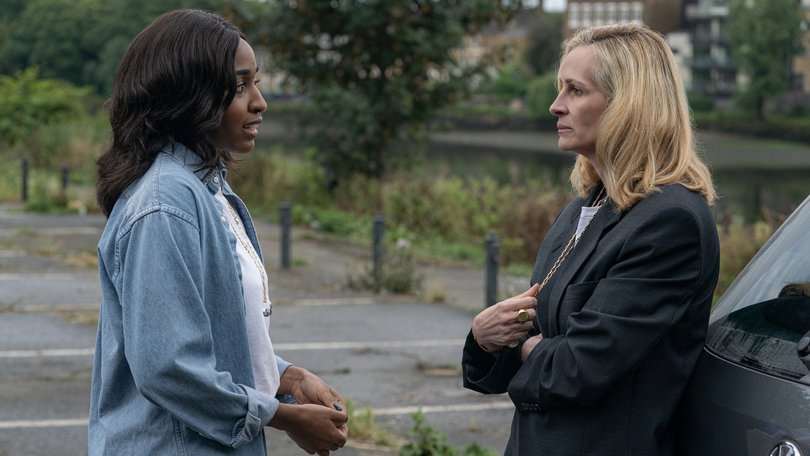
Ayo Edebiri remembered something her director, Luca Guadagnino, said about the characters in his latest film, the controversial After the Hunt.
“I’ve been thinking about how in a lot of his other films, the characters are unafraid of desire, but in this film, everybody is quite locked up by it. It’s like a pressure cooker,” she said.
“You put too much pressure on something and it’s going to come out sideways, jagged and all wrong.”
Sign up to The Nightly's newsletters.
Get the first look at the digital newspaper, curated daily stories and breaking headlines delivered to your inbox.
By continuing you agree to our Terms and Privacy Policy.Edebiri and Guadagnino, along with their co-stars Julia Roberts and Andrew Garfield are on the terrace at the ritzy Hotel Cipriani in Venice, where After the Hunt had its world premiere two days earlier during the lagoon city’s famed film festival.
The film drew immediate reactions, with audiences unable to arrive at a consensus about the MeToo-themed story set at Yale University, centred on Alma (Roberts), an imperious philosophy professor in the aftermath of a student, Maggie (Edebiri), accusing another teacher, Hank (Garfield), of sexual assault.
After the Hunt is murky on guilt. Like Alma, the viewer is never certain who is telling the truth.
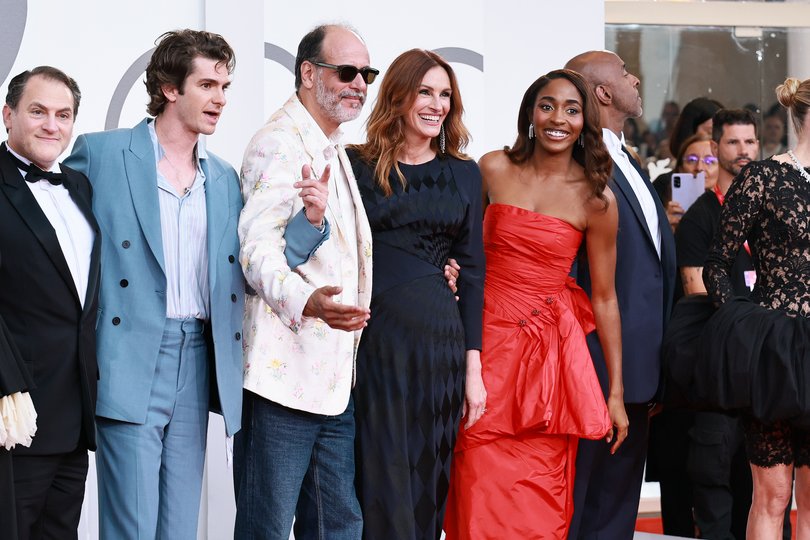
“Everyone’s going to have very, very different responses. So, it’s interesting (if) you see Hank as the villain,” Garfield said. “What Luca is so great at doing, and what the script is so wonderful at doing, is it doesn’t cast anyone as victim, villain or hero.
“It’s holding up a mirror to every audience member to reckon with themselves and their own relationship to their own villainy, their heroism and their own victimhood. It’s all of those indescribable areas in between that don’t adhere to any of those binaries.”
Garfield was interested in the divisive reactions, almost as if it was a Rorschach test into the individual viewer, which he also applied to himself, examining the ways in which After the Hunt made him feel comfortable or uncomfortable.
He later added, “I’m not saying that Hank isn’t the villain, just for the record.”
Those early responses out of Venice weren’t generally effusive, and the reviews were mixed (it probably didn’t help that the heavens opened up and absolutely drenched the 1500 press and industry audience queued up for first screening, who then sat in an airconditioned theatre, cold and wet, for two and a half hours), asking just exactly what Guadagnino was trying to say about MeToo, cancel culture and its intersection with privilege.
The Italian filmmaker behind Call Me By Your Name, Challengers and I Am Love, will not give you easy answers.
“After the Hunt is a movie about the dimensions of what happens when someone wants to speak a truth that is subjective, and the other is willing or not willing to listen to the truth, or actually wants to impose their own truth,” he said.
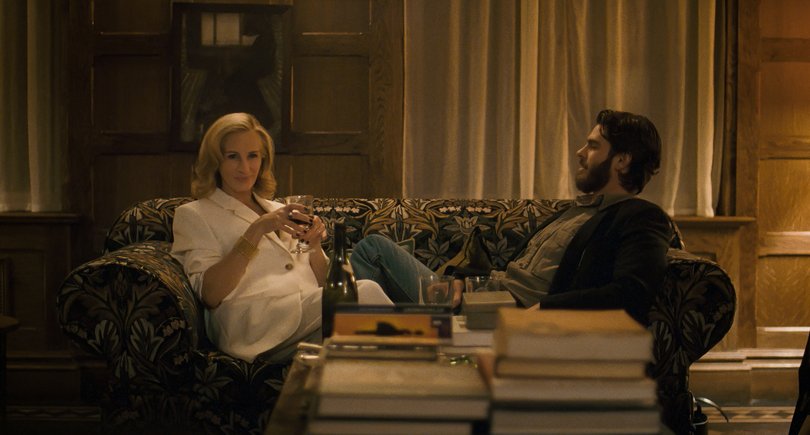
Guadgnino described his film as a “moral thriller”, a power play between its strong-willed main characters, which also includes those portrayed by Michael Stuhlbarg (as Alma’s husband) and Chloe Sevigny (as a university colleague). They’re fighting over position, over owning the narrative, and over Alma’s affections.
“It’s also a movie that tries to let the audience make up their mind from what they’ve experienced, and at the same time, invite the audience to have a conversation about it so that instead of feeling neglected in the possibility of expressing their point of view, actually they’re very much encouraged,” the filmmaker added.
Guadagnino picked up the script by Nora Garrett on a flight to Los Angeles and by the time he landed, not only was he keen to board, he’d also arranged a blind date with Roberts (other airlines, not Qantas, you’ll recall, have WiFi on international flights).
“It was the most exciting date I had in my life,” Guadagnino said.
It was kinship at first sight. Roberts explained, “I had never felt such an ease. How could I possibly feel at ease sitting on a couch with Luca Guadagnino? We had our noses practically pressed together for an hour, and it was just life affirming. Really. Truly.”
Alma is a departure for Roberts for anyone who associates her with her most famous roles. The likes of Pretty Woman’s Vivian, My Best Friend’s Wedding’s Julianne, and Erin Brockovich are feisty but ultimately warm and oozing with compassion.
Alma, at least on the surface, lacks that sympathy (the most obvious recent cinematic comparison is Cate Blanchett’s Lydia Tar from Tar) as she is put in the middle of this conflict, as her loyalty seemingly wavers between Maggie and Hank.
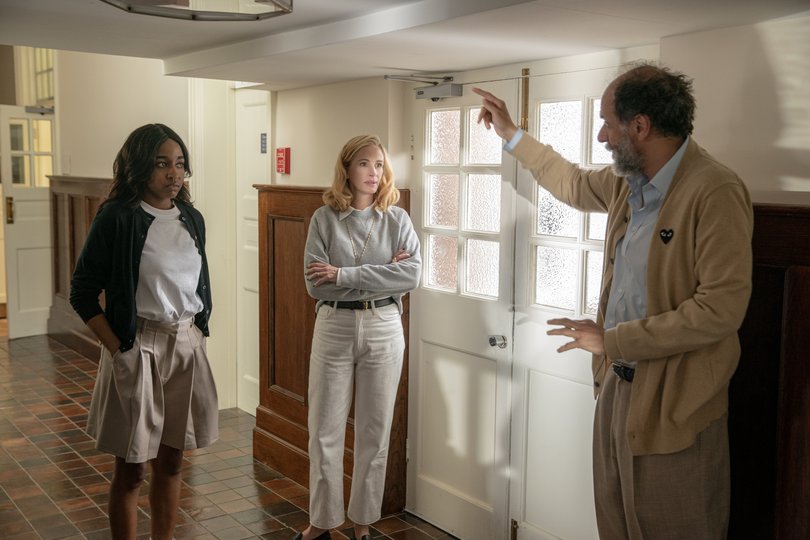
She is a cypher, to the audience and to the other characters, making choices and speaking things that infuriate both. Even Roberts said she has spent enough time with Alma.
“I don’t have someone like that in my life,” Roberts said. “It was a fascinating study of a person. Coldness is not something that comes naturally to me in any way, almost to a fault.
“So, exploring the idea of someone behaving like that and why people behave like that, and where does it really come from, and what is the point of it? Because, to me, it cuts you off from so much value in life.”
Still, Alma had to have a seam of that Roberts charisma for the viewer to buy why everyone else in her world is obsessed with her – and why they needed her to be believe them.
But there are no winners in After the Hunt, Garfield contended, despite the myriad privileges, some more moneyed than others, each character has in the film’s rarefied world. Using the sphere of an Ivy League college, After the Hunt suggests that beneath the sandstone, the quiet luxury outfits, the lush apartments and the time spent debating the finer details of philosophy is an inescapable rot that cannot withstand a hint of scandal.
It’s a house of cards.
“The idea of winning in this current culture, the world that we inhabit right now, the very capitalistic world that we’re in right now, winning is not winning,” Garfield said. “However many billions of dollars (you may have), on a yacht, whatever, spiritually, you are nowhere near victory. On a soul level, there’s no winning there.
“If we want to keep giving gold medals to the egos, we will end up with giving the highest office in the land to the person that currently has it. That’s where we end up. We end up as sick as we are.”
Edebiri said the one thing she’s never experienced walking out of any Guadagnino film is silence.
“There’s always a conversation, there’s always something happening.”
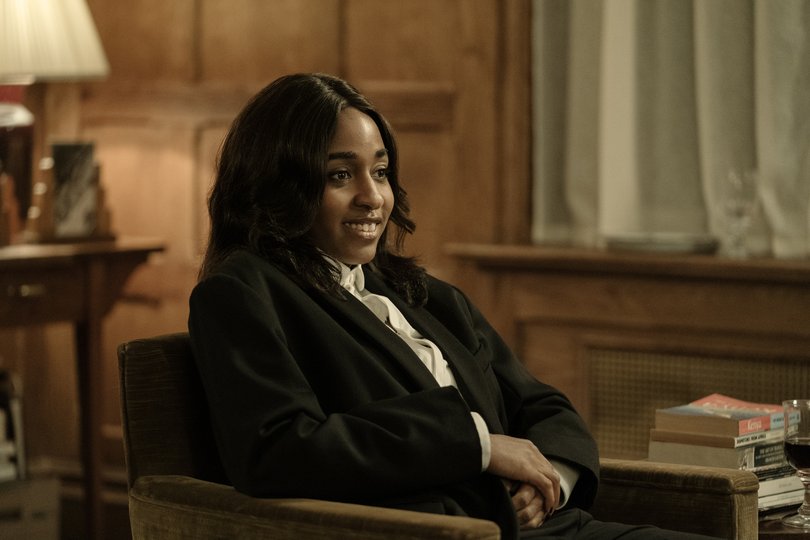
Guadagnino poked a hornet’s nest in making a film that makes no declarative statement on how a MeToo scandal unfolds. It’s why people are so uneasy with After the Hunt, afraid it’s anti-feminist or disbelieving of victims, or it’s too unquestioning of accusations. The reactions cross the whole spectrum.
“We need to have conversations, no matter how painful or boring or annoying or repetitive they might seem, we have to get in the mud together, and I think it’s going to suck,” Edebiri said. “The whole point is that it has to suck.
“If we want real, rooted, heart-to-heart, eye-to-eye communication, it can be done.”
She revealed she grew up in a “really, really religious and very socially conservative” environment but that things can change, as she saw in her parents and her family, because they did the work in having real conversations, the ones they didn’t want to have.
“I was really afraid my whole life, I did some work, but also my parents did, and I was really impressed and moved by them,” she said.
“I was like, ‘You’re human beings and you’ve been doing this a bit longer than me, and you’re also capable of change’.”
Edebiri said she saw her job as an artist to not just reflect the past and the present, but to imagine what the future might look like.
“Sometimes I don’t know what that’s going to look like, but if I’m not at least trying to imagine those things or reflect what I know, then it’s moot. Then there’s no point.
“Will the film be able to spark those conversations? I don’t know. We did what we did and I hope that the art sticks. If people are having conversations, that’s a good thing.”
After the Hunt is in cinemas on October 16

